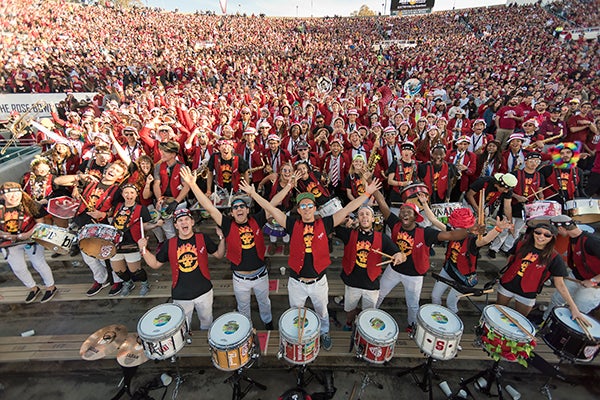Sanctions are being largely – but not entirely – lifted on the Leland Stanford Junior University Marching Band, allowing the popular performance group to return to “good standing” as a student organization and to again travel with Cardinal sports teams.

The Stanford Band poses for a photo at the 2016 Rose Bowl Game. (Image credit: L.A. Cicero)
The removal of the group’s “provisional status,” imposed in January of this year, was recommended by the university Band Oversight Committee, which has been meeting with student leadership to help the group revise its bylaws and other procedural manuals.
The approximately 200-person scatter band was originally suspended in December 2016 for the academic year after an investigation revealed violations of university policy, including hazing, sexual harassment and alcohol abuse. Among the sanctions imposed was a travel prohibition that kept the Band on campus and unable to travel with Cardinal teams.
Impressive progress
In January, former Provost John Etchemendy, impressed with the initial progress made by Stanford Band leadership, replaced the suspension with a pathway for the group to resume activities as a student-run organization. Besides Etchemendy, the Band Oversight Committee includes Chris Griffith, associate vice provost for student affairs; Patrick Dunkley, deputy athletic director; and Bruce Heiman, a Stanford alumnus and former Band manager.
At that time, Etchemendy praised the students for what he called “an impressive set of actions” in response to changes requested by the university. The subsequent update in its organizational status allowed the group to continue its search for a new director, recruit new members and perform at events approved by the Band Oversight Committee.
“The students have been working diligently on changing the culture of the Band,” said Etchemendy. “As a result, we decided to remove the provisional status, return the Band to ‘good standing’ and lift the travel ban.”
The news was greeted with excitement and relief by student leaders of the Stanford Band.
Alcohol ban remains
“It seems that we have experienced our lowest of lows with our initial suspension at the beginning of this year and our highest of highs in quite a long time with the lifting of the travel ban and the removal of our provisional status,” said Band manager Cassidy Forler, a junior majoring in biomechanical engineering.
She added, “Seeing this outcome in a mere four months speaks to the hard work and dedication of our alumni, members and especially our student staff. We are so excited to be back in good standing with the university and to have the freedom to start operating back at our full capacity.”
The alcohol ban imposed on the group, however, will be modified rather than lifted. Etchemendy said it will remain in place through the fall football season as the Band continues to work with the Office of Alcohol Policy and Education to reintroduce responsible use of alcohol at social events.
“This modification of the alcohol ban will allow the current management to work through the fall to make sure responsible patterns of alcohol use replace some of the unhealthy traditions that proved problematic in the past,” Etchemendy said.
Earlier this spring, Russell Gavin, former associate professor of music education/band at Baylor University, joined the university as director of the Stanford Band. As director, Gavin offers musical leadership and instruction to the Band members and supports the group during rehearsals and performances.